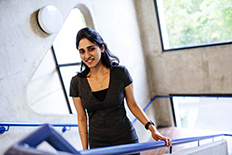
 Neha N. Parayath
Neha N. Parayath
Pharmacology and Toxicology
After completing undergraduate and master's degrees in biotechnology in Mumbai, India, Neha N. Parayath applied to Otago to do a PhD in the Department of Pharmacology and Toxicology.
She received an Otago doctoral scholarship and while waiting for visa formalities she worked as an assistant research fellow in a Mumbai lab specialising in developmental neuroscience.
Neha thought she had prepared for Dunedin's different culture, but her arrival coincided with a University break and there were even fewer people around than she expected.
“I found it really quiet, but then I started liking the calmness. I think I have got used to it now, and I can work in peace.”
She found the staff at Otago more accessible than academics in Mumbai, where they are overwhelmed by student numbers.
The project Neha had thought she might work on had already started when she arrived, but she was happy to begin another.
“If you are planning to do a PhD it is important to have an open mind and be willing to explore other things. You may come across something new and all the while you are gaining experience.”
Neha worked on developing oral anti-cancer nano drugs designed to target specific tumours, particularly in colorectal cancers, which are common in New Zealand.
“Using nanoformulations is like labelling the drugs with a postal address so that they reach the desired destination in the body.
“I started with in vitro work and then progressed to animal models. I found using mice challenging but really interesting because you see your science actually having an effect.”
Neha has submitted her thesis and is now applying for post-doctoral positions in the US, where there are more specialists in her field — “but I would love to come back to New Zealand if there is an opportunity to do so.”